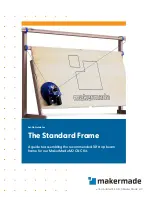
Basics
4.2
Emissivity
of
Target
Object
To
determine
the
emissivity
of
the
target
object
refer
to
section
12.1
Determination
of
Emissivity
on
page
80.
If
emissivity
is
low,
measured
results
could
be
falsified
by
interfering
infrared
radiation
from
background
objects
(such
as
heating
systems,
flames,
fireclay
bricks,
etc.
close
beside
or
behind
the
target
object).
This
type
of
problem
can
occur
when
measuring
reflective
surfaces
and
very
thin
materials
such
as
plastic
films
and
glass.
This
measurement
error
can
be
reduced
to
a
minimum
if
particular
care
is
taken
during
installation,
and
the
sensing
head
is
shielded
from
these
reflecting
radiation
sources.
4.3
Ambient
Temperature
The
sensing
head
was
developed
for
the
following
ambient
temperature
ranges:
•
MIH:
0
to
180°C
(32
to
356°F)
•
MIC:
0
to
125°C
(32
to
257°F)
•
MID:
0
to
85°C
(32
to
185°F)
The
MID
can
operate
in
ambient
temperatures
up
to
200°C
(392°F)
with
the
air
‐
cooling
accessory.
4.4
Atmospheric
Quality
If
the
lens
gets
dirty,
infrared
energy
will
be
blocked
and
the
instrument
will
not
measure
accurately.
It
is
good
practice
to
always
keep
the
lens
clean.
The
Air
Purge
Jacket
helps
keep
contaminants
from
building
up
on
the
lens.
If
you
use
air
purging,
make
sure
a
filtered
air
supply
with
clean
dry
air
at
the
correct
air
pressure
is
installed
before
proceeding
with
the
sensor
installation.
12
MID
















































